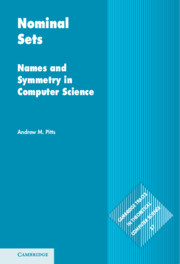0 - Introduction
Published online by Cambridge University Press: 05 July 2013
Summary
This is a book about names and symmetry in the part of computer science that has to do with programming languages. Although symmetry plays an important role in many branches of mathematics and physics, its relevance to computer science may not be so clear to the reader. This introduction explains the computer science motivation for a theory of names based upon symmetry and provides a guide to what follows.
Atomic names
Names are used in many different ways in computer systems and in the formal languages used to describe and construct them. This book is exclusively concerned with what Needham calls ‘pure names’:
A pure name is nothing but a bit-pattern that is an identifier, and is only useful for comparing for identity with other such bit-patterns – which includes looking up in tables to find other information. The intended contrast is with names which yield information by examination of the names themselves, whether by reading the text of the name or otherwise. […] like most good things in computer science, pure names help by putting in an extra stage of indirection; but they are not much good for anything else.
(Needham, 1989, p. 90)We prefer to use the adjective ‘atomic’ rather than ‘pure’, because for this kind of name, internal structure is irrelevant; their only relevant attribute is their identity. Although such names may not be much good for anything other than indirection, that one thing is a hugely important and very characteristic aspect of computer science.
- Type
- Chapter
- Information
- Nominal SetsNames and Symmetry in Computer Science, pp. 1 - 10Publisher: Cambridge University PressPrint publication year: 2013



